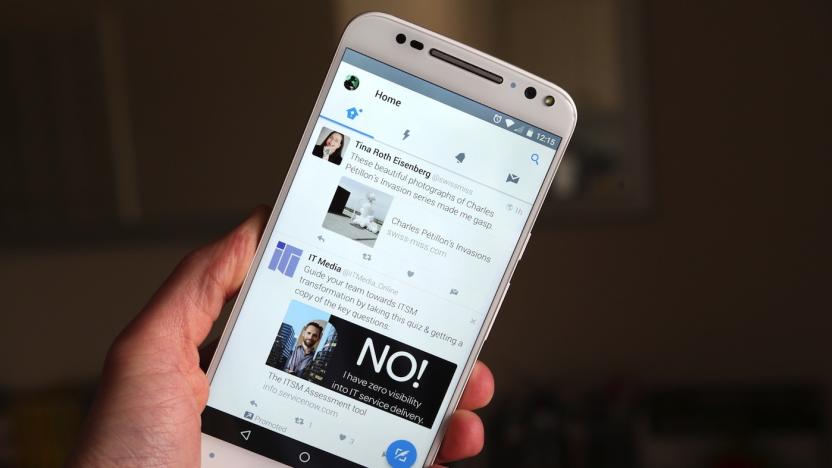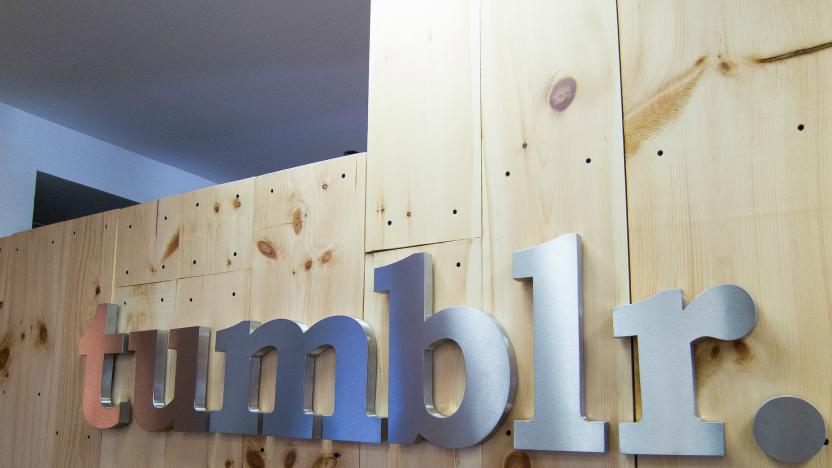block
Latest

Windows 10 will soon block non-Store apps like OS X does
In its latest beta build of the Windows 10 Creators Update, Microsoft has slipped in a new feature that could make your PC either safer or more irritating, depending on your point of view. If you try to install a Win32 (desktop) app, it'll either pop up a warning that "the app you're installing isn't from the Windows Store" or completely block it, depending on the level of security you select. When enabled, you can still install Windows Store and Universal Windows Platform (UWP) apps with no warning.

Twitter makes it easier to block abusers (updated)
Twitter has already taken a few steps to curb harassment, but what about the basic act of blocking someone? That's getting easier, too. The social network is introducing an improved blocking experience that takes away some of the headaches: just go to the offending tweet, choose Block from the "..." button and that person vanishes from your timeline. It's not going to get rid of systematic abuse (such as people who create dummy accounts or put you on targeted lists), but it will help you get back to your regular tweeting a little bit sooner. Update: Twitter has chimed in to explain exactly what's new. Before, people you'd blocked could still see what you wrote through quotes and retweets. Now, it's a complete vacuum -- block someone and they can't see anything you say, even if someone else is quoting you.

Porn site bans all North Carolina users over anti-LGBT law
Since Monday, porn site XHamster.com has refused access to any user with a North Carolina IP address. The site says the block will stay in place until the state repeals House Bill 2, which prevents cities and counties passing rules that protect LGBT rights. "We have spent the last 50 years fighting for equality for everyone and these laws are discriminatory which XHamster.com does not tolerate," said the company's spokesman in official statement sent to The Huffington Post.

Indonesia blocks Tumblr because it hosts pornography
Indonesia has banned Tumblr, the internet's GIF factory and pizza pleasure palace, because the site hosts pornographic content, the BBC reports. Indonesia's Information Ministry apparently didn't consult Tumblr or its parent company, Yahoo, before blocking the site. "We must ban the site first and tell them later," Information Ministry e-business director Azhar Hasyim told the BBC.

Has the 'Bitcoin experiment' failed?
A prominent voice in the Bitcoin community has announced that he is abandoning the cryptocurrency that he helped to popularize. Mike Hearn has revealed that deep divisions within the platform's "leadership" and a looming technical apocalypse threatens the system's entire existence. The creator of bitcoin has explained his position in a lengthy Medium post, saying that he has sold his coins and is washing his hands of Bitcoin. As far as he is concerned, the "Bitcoin experiment" has "failed."

Gmail's block tool is a quick way to silence annoying senders
The block button on Twitter is handy for getting rid of someone who fills your mentions with a bunch of noise. Now, there's a similar option for Gmail. Under the reply and forward options in Google's email app, there's now a block tool to quickly get rid of unwanted noise. Once you block a sender, messages will automatically go to your Spam folder. You can undo the action from the Settings menu, should the need arise. Block is ready to be put to work today on the desktop and it's set to arrive in the Android app over the course of the next week. What's more, the mobile software is also getting the handy unsubscribe feature that's already available on the web.

Amazon accused of spying on reviewer's social media profiles
Amazon has reportedly blocked a person from reviewing an e-book because the company thinks that they are friends with the author. Imy Santiago attempted to post a review of an unnamed title several times, each time being told that it was in violation of the site's policy. When she pushed the retailer to explain why, the response came back that the piece was stopped because she knew the author personally. At first blush, that makes sense, since it stops unethical authors from garnering unfair praise on unworthy titles -- but then you start asking questions, like how in the hell did Amazon know that these two were friends?

UK ISPs ordered to block e-book piracy sites
In a major victory for book publishers, the UK's High Court has ordered internet service providers (ISPs) to block several sites offering pirated e-books. The decision means that BT, Sky, Virgin Media, TalkTalk and EE now have 10 days to comply and ensure their customers can't access the following link depositories: AvaxHome, Ebookee, Freebookspot, Freshwap, Libgen, Bookfi and Bookre. The Publishers Association (PA), which sought the blocks under the UK's Copyright Design and Patents Act 1988, claims the sites collectively hold around 10 million e-books, and that at least 80 percent of them are infringing copyright. It's been described as the "first action of its kind brought by UK book publishers," following similar ISP blocks levied against sites hosting music, movies and TV shows.

European carriers could block internet ads for their own benefit
While advertising has become a necessary evil, some companies have become specialists in helping you rid yourself of it. If you live in Europe, you could soon find help from an unlikely ally, after a Financial Times report noted that some operators are ready to block ads from Google, Microsoft and Yahoo on your smartphone. According to the newspaper, one European carrier has already installed ad-blocking software in its data centers, with the intention of deploying it before the end of the year. Other providers have reportedly indicated that they may do the same and would ask customers to opt-in to the service.

UK government plans to block porn sites without age verification
It's election season in the UK, so get ready for a near-endless stream of new policies, proposals and promises from the major political parties. The latest from the Conservatives is actually an old idea that's been kicking around since last autumn: to force sites containing adult material to introduce proper age checks. It goes beyond the UK government's rather unpopular porn filters, which ISPs are now forced to offer customers as an "unavoidable choice." Simply highlighting the feature was supposed to encourage adoption, particularly from parents, but the latest figures from Ofcom suggest its impact has been limited. Now, the Conservatives want "effective age verification controls" for all online pornography, and plan to block sites which refuse to implement proper checks.

Gmail goes down in China, Great Firewall may be to blame
Many China-based Gmail users have discovered that they've been unable to access emails since the start of the weekend. According to GreatFire.org, a China-based freedom of speech group, many Gmail web addresses were blocked in China on Friday -- continuing three days later into today. Even Google's Transparency Report, showing real-time traffic to services like Gmail, shows activity plummeted last Friday. According to Reuters, a Singapore-based spokesman for Google said that there was "nothing wrong on our end." Also talking to Reuters, a Chinese Foreign Ministry spokeswoman said she did not know anything about Gmail being blocked, adding that the government remained committed to aiding overseas business: ""China has consistently had a welcoming and supportive attitude towards foreign investors doing legitimate business here. We will, as always, provide an open, transparent and good environment for foreign companies in China."

The majority of Brits are disabling government-backed porn filters
Don't be too shocked, but the UK government's porn filter isn't proving very popular. A new report from communications regulator Ofcom reveals that just one in every seven customers are letting the big four UK ISPs guard them from porn and other online nasties. While tiny minorities of users at Virgin Media (four percent), BT (five percent) and Sky (eight percent) opted to keep the filter, TalkTalk ranked as a significant outlier: it reports that 36 percent of customers enabled the government-mandated filters on their home router. TalkTalk puts it down to the fact it pre-ticks the selection box, meaning more customers are likely to keep the option enabled on their account.

Blame Canada: Google ordered to block website links worldwide
A minor Canadian court dispute has resulted in a judge's far-reaching decision that Google must block a website's search results worldwide, not just in Canada. It arose from a case involving a company that stole its ex-partner's intellectual property and fled abroad to sell pirated equipment online. Following a court order, Google Canada pulled the rogue firm's search results, but it put up new sites faster than they could be erased. As a result, a judge ordered Google to spike all its links worldwide -- an unprecedented ruling against a search company. Google said that it would appeal to BC's highest court, claiming the judge overstepped her jurisdiction. Many legal critics also found the ruling puzzling, saying it could set a legal precedent limiting the right to free speech.

Iraq blocks Twitter, Google, YouTube and Facebook in effort to stifle insurgency
The Iraqi government has essentially shut off all social networking in the country in an effort to stem the rising tide of insurgent group Isis (Islamic State of Iraq and the Levant). The country has found itself thrown into chaos recently as the Islamist militants have overrun the cities of Mosul, Falluja and Ramadi in a march towards Baghdad. Isis, like many of the rebellions in the region recently, has made heavy use of social media for both propaganda and organization. In particular the group has spread its hard line religious and anti-western message via YouTube. Presumably prime minister Nouri al-Maliki has had the services blocked in an effort to disrupt Isis's movement and planning, and perhaps give the government's troops an opportunity to strike back.

Facebook is the latest coup victim in Thailand, where the selfie reigns supreme
Foreign governments have been blocking Twitter and Facebook off and on for years, and now Thailand's responsible for some social service downtime. The country's Information Communications Technology (ICT) Ministry disabled access at the military's request, taking the site offline for about 30 minutes yesterday afternoon. According to a Reuters report, Surachai Srisaracam, an ICT official, said the action was intended to "thwart the spread of online criticism of the military" following the recent coup. The official added that the government planned to meet with other social sites, such as Instagram and Twitter, "to ask for cooperation from them." Meanwhile, many Thai citizens are using sharing sites for more innocuous purposes, such as posting selfies with soldiers, which they are once again free to do. Update, May 30th: That meeting between social networks and the Thai military? Guess what. No one showed up. [Image credit: Bloomberg via Getty Images]

Instagram is the latest social network to hit Iran's blacklist
Iran's top officials may use social media, but the country's general populace isn't allowed to join them. The nation has already banned Facebook, Twitter and WhatsApp, and yesterday it reportedly added Instagram to the naughty list. According to the AP, a private lawsuit was brought against Iran's Ministry of Communications, forcing the bureau to restrict access to the Zuckerberg-owned photo-sharing service. There's no evidence that such filtering is in place right now, and users in Tehran were still able to take some selfies on Friday lunchtime. Still, given that social media is a threat to the country's conservative establishment, we imagine that someone will keep bringing lawsuits until no-one can utter the phrase "lemme take a selfie."

Twitter's blocking of 'blasphemous' content raises questions over its censorship policy
At first glance, Twitter's international policy on censorship seems reasonable. If the laws of a particular country require content to be locally blocked, then Twitter will adhere to that, deeming it to be a lesser evil than having the social network blocked in its entirety. This is what's just happened in Pakistan, where five requests from a government office have, for the first time, resulted in "blasphemous" and "unethical" tweets being blocked to Pakistani users -- including crude drawings of the Prophet Muhammad. This successfully avoided a repetition of what happened two years ago, when similar content temporarily led Pakistan to deploy a site-wan ban against twitter.com. However, critics say that, in practice, Twitter's policy isn't working fairly, because it's giving too much power to would-be censors who, even within their own countries, don't actually have any authority to block or delete content.

Google takes legal action against Turkey's YouTube ban
Remember how a Turkish court ordered an end to the country's YouTube ban? Well, that decision has already been reversed -- and Google has launched an all-out legal assault in response. The search firm has filed a complaint with Turkey's Constitutional Court protesting the block, to start with; it's also appealing the reinstatement of the ban, and it's suing to negate the decision altogether. The company doesn't have more details to share at this stage, but a spokesperson both acknowledged the court battles to us and said it was "obviously very disappointing" that the censorship is still in effect. It's too early to know whether the anti-ban campaign will prove successful, but Twitter's recent victory suggests that Google has a fighting chance.

Turkish court half-heartedly orders end to YouTube ban
Turkey's Twitter ban may have come to an end, but the country's block on YouTube remains steadfast. In the latest development to this censorship saga, Reuters reports that a court in the Turkish capital has declared the YouTube situation a human rights violation, and instructed that the block be removed. Well, almost, as the court did state 15 specific videos could stay restricted, but that a blanket ban was unnecessary. The ruling tipped its hat to a similar decision from Turkey's Constitutional Court, which previously declared the Twitter lockdown a violation of free speech. Regardless of this official order, it's still up to the powers that be to do the unbanning, but we doubt they'll be up for bearing the pressure to do so much longer. If certain politically sensitive videos stay unavailable when that happens, though, then the Turkish Prime Minister and Co. have kind of won anyway, we'd say.

ArcheAge Russia is blocking non-Russian IPs [Updated]
North American players looking to play ArcheAge have kind of come to terms with the idea that XLGAMES is taking a long time to localize the game. A very long time. So long that several players have found it far more efficient to just log on to the game's Russian client. If there were hypothetically an English patch for it, that would make life that much easier for players who don't speak Russian. However, it's a moot point now, as the game's Russian servers are now blocked for players not located in Russia or former Soviet countries. According to Google translate, Mail.ru has implemented the IP block at XL's request, stating that "from states not listed, [logging in] would be impossible." No word on any potential refunds for players playing from outside of the now-limited list of available countries. [Thanks to Preacher for the tip!] [Update: Tipster Potaco pointed us toward a thread on the ArcheAge Source forums, where US posters are reporting that they are still able to log into the game with US IPs. Participants remain uncertain whether the region-blocking has been permanently lifted or will be reinforced with the next patch.]












